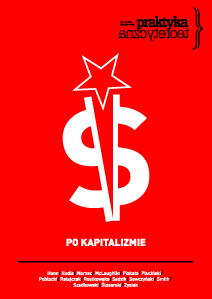Abstract
Although few questions are more important than whether a viable
alternative to capitalism is possible, radical theory has tended
to shy away from directly engaging the issue – even when
the theoretical and practical cost of the claim that “there is no
alternative to capitalism” is acknowledged. This essay argues
that the barrier towards envisioning a viable alternative needs
to begin by revisiting Marx’s critique of capitalism as well as
his many criticisms of the socialist and communist tendencies
of his time. Implicit in Marx’s critique of the logic of capital
and the failure of radical theoreticians in his time to comprehend
it is a specific concept of a post-capitalist society that
today’s social movements neglect to their peril. By re-visiting
Marx’s body of work in light of what it offers for envisioning life
after capitalism, we may be able to grasp how deeply his work
speaks to us today.
References
Dunayevskaya, R. 1944. ,,A New Revision of Marxian Economics.” American Economic Review 34.
Dunayevskaya, R. 2000. Marxism and Freedom, from 1776 Until Today. Atlantic Highlands, NJ: Humanities Books.
Dunayevskaya, R. 2002. The Power of Abstraction. in The Power of Negativity: Selected Writings on the Dialectic in Hegel and Marx, Lanham: Lexington Books.
Hegel, W.H. Phenomenology of Spirit. Oxford: Oxford University Press, 1977.
Hudis, P. 2012. Marx’s Concept of the Alternative to Capitalism. London: Brill.
Hudis, P. 2013. Marx’s Concept of the Alternative to Capitalism, Chicago: Haymarket.
Kornai, J. 1992. The Socialist System: The Political Economy of Communism. Princeton: Princeton University Press.
Lukács, G. 1978. History and Class Consciousness: Studies in Marxist Dialectics. London: Merlin Press.
Lukács, G. 1991. The Process of Democratization. Trans. S. Bernhardt. Albany: SUNY Press.
Marx, K. 1975. Economic and Philosophic Manuscripts of 1844. in Marx-Engels Collected Works, vol. 3. New York: International Publishers.
Marx, K. 1976. The Poverty of Philosophy. in Marx-Engels Collected Works, vol. 6. New York: International Publishers.
Marx, K. 1977. Capital, vol. 1. New York: Vintage.
Marx, K. 1986. Critique of the Gotha Program. in Marx-Engels Collected Works, vol. 24. New York: International Publishers.
Marx, K. 1986. Drafts of The Civil War in France. in Marx-Engels Collected Works, vol. 24. New York: International Publishers.
Marx, K. 1986. Grundrisse, in Marx-Engels Collected Works, vol. 28. New York: International Publishers.
Marx, K. 1991. Economic Manuscript of 1861-63. in Marx-Engels Collected Works, vol. 33. New York: International Publishers.
Postone, M. 1993. Time, Labor, and Social Domination: A Reinterpretation of Marx’s Critical Theory, Cambridge: Cambridge University Press.
Sartre, J.P. 1968. Search for a Method. New York: Vintage Books.
Žižek, S. 2012. The Year of Dreaming Dangerously. London: Verso.
License
“Theoretical Practice” seeks to put into practice the idea of open access to knowledge and broadening the domain of the commons. It serves the development of science, thinking and critical reflection. The journal is published in open-access mode under the CC-BY-NC-SA 4.0 license (detail available here: http://creativecommons.org/licenses/by-nc-sa/4.0/). Articles published in the journal may be freely distributed, stored, printed and utilized for academic and teaching purposes without restrictions.
They should not be, however, used for any commercial purposes or be reconstructed into derivative creations. Access to the journal may not be limited or offered for a fee by any third party.
Prospective authors are obliged to fill in, sign and send back the publishing contract compliant with the CC licencing. [PL.pdf, PL.doc, EN.pdf,EN.doc].
According to this contract, authors grant the journal a non-exclusive right to publish their work under the creative commons license (CC-BY-NC-SA 4.0) without any financial obligation on both sides of the contract.
Before submission authors should make sure that derivative materials they use are not protected by copyright preventing their non-commercial publication. Authors are responsible for any respective copyright violations.
